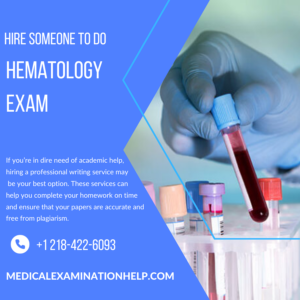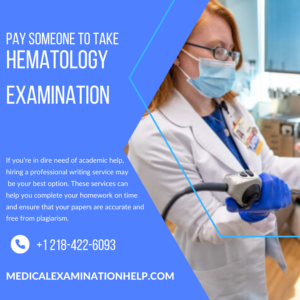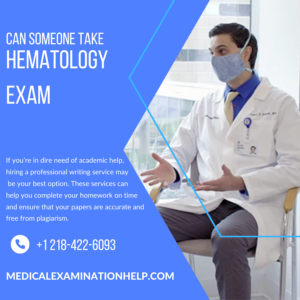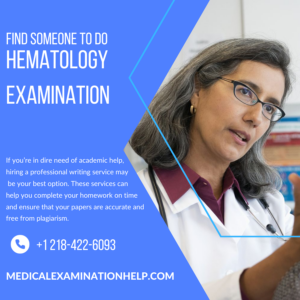
 Hematology is the study of blood-related diseases, including anemias and cancers. It also includes bone marrow disease and the lymphatic system, which is a network of tissues that clears waste.
Hematology is the study of blood-related diseases, including anemias and cancers. It also includes bone marrow disease and the lymphatic system, which is a network of tissues that clears waste.
Hematologists treat many different blood disorders, including leukemia, lymphoma, Pay Someone To Take Medical and myeloma. They also help patients who need a bone marrow transplant or stem cell transplant.
Hematologists are medical doctors who specialize in diseases of the blood and its related structures, including bone marrow. They also study hemoglobin, a protein in red blood cells that carries oxygen throughout the body. They may perform tests such as a complete blood cell count, which can help diagnose anemia and other blood disorders; platelet count, which is used to identify bleeding problems; and a lymphatic system examination to assess cancerous tumors. Some hematologists have completed a three- to five-year fellowship and focus on adults with blood diseases, while others have specialized in children’s hematology or hematology/oncology. They can perform a blood transfusion, which involves injecting healthy blood into the patient.
Hematology is the study of blood and related tissues, such as bone marrow. It’s a subspecialty of internal medicine and includes several types of cancer. Blood-related diseases can affect many of the body’s systems and cause a wide range of symptoms. They include anemia, Blood Cell Antibody clotting disorders and bleeding disorders. Hematologists use many tests to diagnose these conditions and monitor them. They also perform treatments, such as blood transfusions. They may also treat blood cancers with chemotherapy, in which they inject the body with chemicals that kill fast-growing cells.
Hematologists typically spend 9 years completing their medical education, which includes 3 to 4 years of residency after medical school and a three-to-five-year fellowship. Some have a second specialization in oncology, which is the branch of medicine that treats cancer. Hematologists can also be hematology/oncologists, who combine oncology and hematology. Some specialize in adult hematology or pediatric hematology. They also can have a focus on coagulation disorders or blood cancers.
Hematology is the study of diseases that affect your blood and bone marrow, including leukemia and lymphoma. It also includes disorders that keep your blood from flowing properly, Acute Lung Injury such as blood clots and bleeding disorders. Some diseases are benign (noncancerous), while others are malignant (cancerous).
Hematologists can treat many of these conditions. They can diagnose diseases using blood tests and other methods, such as bone marrow biopsy, which involves removing a small sample of bone marrow cells for laboratory analysis. They can also prescribe medicines to help manage the condition.
ASH’s Hematology In-Service Exam is a low-stakes test for hematology training programs to use as a medical knowledge assessment tool and to provide feedback on their curriculum. The ISE is available to hematology trainees only and requires registration by a training program. The registration price is $275 for ASH members and $325 for non-members. The exam will be held on February 24.
 Hematologists are doctors who study blood, the blood-forming organs, and blood-related diseases and disorders. They use a variety of tests, such as complete blood counts and bone marrow biopsies, Cold Agglutinin Disease to diagnose and treat conditions.
Hematologists are doctors who study blood, the blood-forming organs, and blood-related diseases and disorders. They use a variety of tests, such as complete blood counts and bone marrow biopsies, Cold Agglutinin Disease to diagnose and treat conditions.
Hematologists can also train in medical oncology to treat blood cancers. These two specialties often work together to treat patients with cancer and other blood-related diseases.
The exam is administered by ABIM and includes questions from three subspecialties: hematology, medical oncology, and hematopathology. The test takes about five hours to complete and requires extensive preparation, including reading the medical literature and answering practice questions. Those who pass the board exam receive certification from ABIM and are eligible to work as hematologists or medical oncologists.
Hematologists are physicians who specialize in the diagnosis and treatment of blood diseases. They may be solo practitioners, or they might be part of a multidisciplinary team. Depending on the type of hematology they practice, they may focus on adult hematology, pediatric hematology, or blood cancers.
ASH’s Hematology In-Service Exam (ISE) is a low-stakes assessment tool for training programs. ISE is designed to assess the knowledge of adult hematology fellows and Phosphate Dehydrogenase provide feedback on curriculum effectiveness. ASH works with the National Board of Medical Examiners to administer the ISE. NBME chief proctors can access the exam by logging in to a secure portal.
Hematology is the branch of medicine that studies blood, blood-forming organs, such as bone marrow, and blood-related disorders and diseases. Hematology tests include laboratory assessments of blood formation, such as a full blood count and a blood film. In a blood film, blood is smeared onto a glass slide and stained with specific dyes to reveal the number, shape, and staining of red blood cells and platelets. The diagnosis of many hematologic conditions is made based on the results of these tests.
The EHA’s Hematology ISE is a low-stakes exam that can be used as an end-of-training assessment or to provide training program feedback. It was developed and reviewed by an expert committee of hematologists with education experience and educationalists.
The exam content is based on the EHA Curriculum and the Campus courses, which cover everything a European Hematologist should know. A survey of Hematology ISE candidates found that 62% expected that passing the ISE would improve their professional career, Chain Disease Test and 21% reported that it already had.
Hematologists study diseases of blood, bone marrow, and lymphatic tissues (the network of glands that clear waste). They also diagnose and treat cancer and other related disorders. These disorders can be benign or malignant and can range from mild to life-threatening.
A hematologist can diagnose and treat diseases of the blood, including anemia, inflammatory diseases, bleeding and clotting problems, and lymphatic disorders such as splenomegaly. He or she may also recommend a hematologist-oncologist, a specialist who can prescribe chemotherapy drugs and other treatments for blood-related diseases.
The hematology In-Service Exam is an assessment of medical knowledge that can be used by training programs to evaluate their curriculum and the effectiveness of their training. The ISE is not a qualification to practice as a hematologist, Myelodysplastic Syndrome Test and only training programs can register their trainees. Hematology training programs may choose to use remote proctoring for the hematology ISE.
Hematological testing plays a critical role in medical care. It helps doctors identify underlying conditions, guide treatment decisions, and monitor outcomes. It also helps patients manage their symptoms, improve their quality of life, and reduce the risk of long-term complications.
The European Hematology Exam was developed to ensure high-quality hematology patient care throughout Europe. It aims to certify excellent knowledge according to the criteria and topics defined in the European Hematology Curriculum. The exam is not meant to substitute for national certification but rather to add an extra stamp of quality.
Hematologists use blood tests to diagnose illnesses, Thrombocytopenia Test such as leukemia, lymphoma, and myelodysplastic syndrome. They also perform treatments, such as transfusions and chemotherapy. They may also prescribe indwelling vascular access devices (such as central lines) and therapeutic phlebotomy and apheresis. Depending on their specialty, they may also do hematopathology, which examines tissue samples for cancer and other diseases. They may also have training in oncology, which enables them to treat non-hematologic cancers and blood-related cancers.
 If you get results that are far above or below typical ranges on a CBC, your doctor may refer you to a specialist called a hematologist. These doctors treat health conditions that affect the blood, Thrombin Generation Test bone marrow and lymphatic system.
If you get results that are far above or below typical ranges on a CBC, your doctor may refer you to a specialist called a hematologist. These doctors treat health conditions that affect the blood, Thrombin Generation Test bone marrow and lymphatic system.
Hematology is a sub-specialty of internal medicine. It focuses on blood diseases, which can be benign (not cancer) or malignant (cancerous). Blood diseases include anemia, hemophilia, and blood-clotting disorders.
Hematology is the branch of medical science that deals with blood-related diseases and disorders. It includes tests that assess the condition of white blood cells, red blood cells and platelets. The results of these tests help in diagnosing a wide range of blood-related conditions, including infection, leukemia, thrombocytopenia, anemia and reactions to chemotherapy.
These tests also check whether immature blood cells are forming, a condition known as reticulocytotic. This can be a sign of an infection or blood cancers such as myeloma.
Hematologists are highly-trained healthcare providers who specialize in blood and the organs that produce it. They also treat diseases involving the blood and bone marrow. The four areas of study within hematology are hemoglobinopathy, hematologic malignancies, Transfusion Reaction Test anemia and coagulation. A hematologist may also have a special interest in a particular disease such as sickle cell anemia or thalassemia. He or she may also be trained in hematology-oncology, a combination of hematology and oncology that deals with cancers of the blood and bone marrow.
Hematology includes a range of blood tests that examine the types and amounts of cells in your body. These tests can help a doctor diagnose, monitor, and treat blood disorders. A hematologist also studies the organs and tissues that use blood to perform their normal functions, including the lymph nodes and blood vessels.
The most common hematology test is a complete blood count (CBC), which counts your red and white blood cells, platelets (tiny cells that clump together to form blood clots), and hemoglobin concentration. The hematologist may also order other blood tests to look for cancer or other problems that affect the blood or bone marrow.
A hematologist usually works as part of a team to treat patients with complicated conditions. Your primary care doctor will refer you to a hematologist, and they may work closely with your internist, pediatrician, IHC Test or oncologist. A hematologist who specializes in lab work is called a hematopathology’s and has additional training in the pathology of the blood and lymph nodes.
Hematology (also known as hematology) is the medical specialty that deals with the study of blood and its components, such as bone marrow, lymph nodes, platelets, and the blood vessels. It covers diseases involving the production, storage, and circulation of blood, as well as its effects on other organs.
The hematology examination involves taking a detailed medical history and checking various test results. Hematologists have the unique opportunity to work directly with patients as well as examining blood under a microscope and analyzing bone marrow samples.
The hematology profession is both challenging and rewarding. It requires a high level of cognitive skills, such as problem solving and critical thinking. It also demands the ability to communicate with patients sensitively, B-Cell Clonality Test especially when they are receiving a diagnosis that may be life changing for them and their family members. Those who enjoy the challenge of overcoming new challenges every day will find that working as a hematologist is an excellent career choice.
Hematology is one of the most sought-after fields of medical studies. But successfully completing the course requires a lot of hard work and dedication. A student has to spend a lot of time in doing lab experiments, attending lengthy lectures and also writing assignments on a regular basis.
Hematology is a field that deals with blood and its disorders. It also includes treating the organs that are directly fed by blood, like kidneys, spleen and lymphoid tissue. Hematology practitioners deal with diseases such as leukemia, lupus and more.
The Hematology examination consists of two components: a written and an applied exam. The written examination is based on a blueprint that reflects the Objectives of Training for Hematology and Indirect Coombs Test aims to assess knowledge related to clinical Hematology. All questions may have associated visual material. Candidates are advised to read the blueprint and objectives thoroughly before taking the exam. The applied exam consists of a clinical vignette and questions from examiners that require a discussion of diagnostic interventions, therapy and/or the natural history of disease.